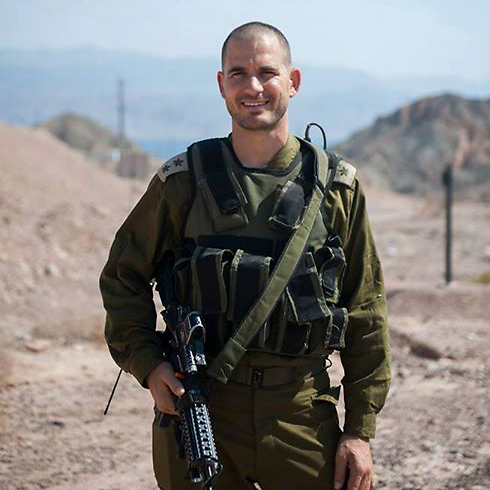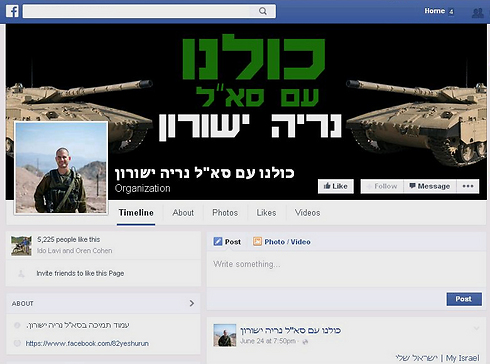Lt. Col. Neria Yeshurun, who led the battalion that lost Captain Dima Levitas, under scrutiny for allegedly approving shelling of clinic — supposedly in retaliation for soldier’s death.
The commander of the 82nd battalion of the 7th armored brigade, Lieutenant Colonel Neria Yeshurun, who fought in the northern portion of the Gaza strip during Operation Protective Edge, will undergo a military police investigation on Monday as a suspect.
Yeshurun’s subordinate, company commander Captain Dima Levitas, was killed by a Palestinian sniper was perched in a medical clinic in Saja’iyya on July 22, 2014.
His battalion mates, who could not attend the next day’s funeral, are believed to have bombarded the clinic from which the sniper shot Levitas. The military police suspect that the fire was authorized by the battalion commander.

“We decided to fire a barrage of shells towards the point from which Dima lost his life, but life has its own rhythm and exactly one second after that they fired back at us,” Lt. Col. Yeshurun told an official military newspaper after the operation. Another officer from the battalion referred to the incident as “closing of a circle and not vindictiveness.”
Troops who served under Yeshurun during the operation recently completed training exercises in the Jordan Valley. Some who spoke to Ynet expressed resentment at the military prosecution’s decision.
Neria led us in fighting alongside Golani soldiers in Saja’iyya with the values of the IDF spirit,” said one soldier who served under the commander. “We followed him with our eyes closed because there is no one more principled than he.
Turning him into a suspect is to make every soldier in the battalion a suspect. Every one of them would like a commander like Neria.” Captain Neria has meanwhile has left his role in the battalion and begun serving as a battalion commander in the Armored Corps’ training division.
News of the investigation was followed by the creation of a Facebook page in support of Yeshurun.
“See this?” read a post on the page. “This is the clinic from which an Arab sniper killed Captain Levitas. A few days ago the IDF decided to open an investigation against Dima’s battalion commander, who ordered fire towards that same ‘clinic’.”
“How convenient and how contemptible it was to exploit this clinic as cover for sniper fire on soldiers, with the complete knowledge that the IDF is extraordinarily careful and avoids firing on clinics,” wrote a soldier. “Hamas filmed the incident and disseminated it proudly.”

Another comment stated: “We are fighting against an immoral enemy. The enemy has no B’Tselem and Breaking the Silence. It’s an enemy that turns clinics into sniper fire positions, that uses civilians as human shields, that sends children to dig tunnels, that booby-trapped the elderly to hurt soldiers, that places rocket launchers next to kindergartens.
“We must not rape, pillage, and murder. We must not behave recklessly. But there are cases that are in a gray zone, there are incidents that were taken out of context, and there are incidents that were intensified by the media. Now it’s our turn to support our soldiers and commanders. They fought for us on the physical battlefield; we’ll fight for them on the public and media battlefield.”
“Harsh consequences”
“It’s unfortunate that the decision to open a criminal investigation into the actions of a high ranking officer during wartime operations was made due to media reports, without checking the facts beforehand,” wrote Attorney Lt. Col. (res.) Shlomo Tzipori, who is representing the battalion commander.
“The timing of the decision is suspect, considering the incident was widely publicized in the media last year. I am convinced that you know very well the harsh consequences that arise as a result of criminal investigations against soldiers and commanders for wartime conduct, not just in relation to the suspect himself, but to all soldiers who risk their lives for the country, specifically the motivation to volunteer and risk their lives in future wars.”
In relation to the incident, his lawyer added that “the fire was conducted as an essential operational necessity, which neutralized an enemy position that had been established in a clinic, and from which accurate fire emanated, killing Captain Dima Levitas.
“The mission of the armored forces in the area was to provide cover fire and allow an infantry force from Golani’s 12th battalion to conduct its mission of locating attack tunnels leading into Israel, which according to early intelligence were located inside of the clinic facilities. This is why there was an operational need to fire towards the building, which held enemy positions.”
The battalion commander’s version of events states that he was operating under IDF protocols, both legal and operational: “A sensitive site like a clinic stops being defined as such once it hosts enemy combatants who conduct offensive operations from the location against Israel or IDF forces, and as such the site immediately becomes an enemy post, which allows us to fire upon it.
“Regarding the clear necessity to shoot, there is the necessity to raise the spirits of the soldiers and commanders of the company whose beloved commander was killed, and to renew their resolve to continue fighting in the mission to discover attack tunnels leading into Israel. The fire mission on the clinic was conducted in a measured and disciplined manner, and included solely two to three tank shells.”
Sources closet to the commander said that before, during, and after the incident, there was no intelligence report that stated that the clinic was housing civilians and non-combatants. “The operational investigation that was conducted by high ranking officers corroborated the commander’s statement and determined that there was no fault in his actions. No complaint was filed by any person or body.”
However, a representative of the IDF Military Advocate General, Captain Matan Solomesh claimed in response that “the decision to open an investigation was made after the MAG received the full content of communications recordings, in which the commander can be heard authorizing the fire on the clinic. The circumstances of the incident offer a reasonable basis for opening an immediate investigation. Every one of the commander’s claims will be inspected thoroughly and professionally.”
Less than a month ago, the MAG announced a widening of the investigations into exceptional incidents that occurred during the operation, in which illegal actions by the forces was suspected.
The investigation of the battalion commander will occur in addition to other investigations, including one which ended recently with the conviction of Golani soldiers who stole money from Palestinian homes in Saja’iyya, as well as other incidents from the operation which the military police are investigating that resulted in the deaths of Palestinian civilians.
These investigations include an incident in which nine Palestinians were killed in a café as a result of an airstrike in Khan Younis.
The MAG has still not decided whether to investigate the commanders of the Givati brigade, who led the aggressive fighting on the first of August in Rafah, as part of the overall attempt to find their friend, the kidnapped officer Sec.-Lt. Hadar Goldin, in a series of actions which led to the death of some 40 Palestinians.
As reported by Ynetnews
